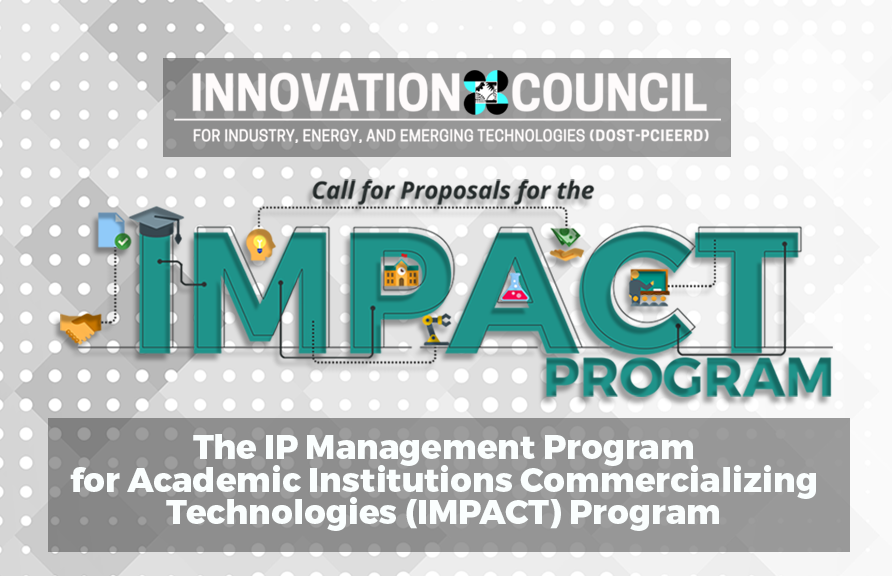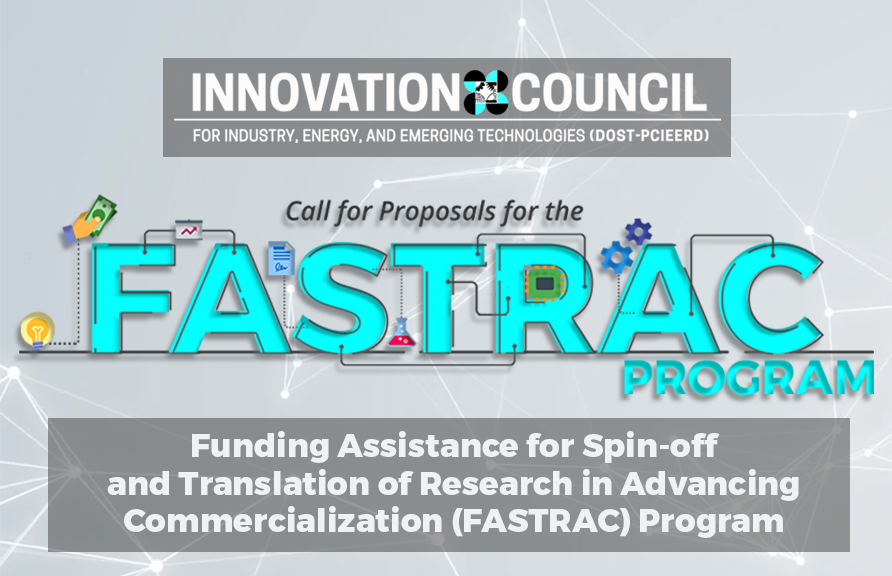DOST-PCIEERD’s EUSTDD Chief and 2018 Outstanding R&D Awards Chairperson Engr. Nonilo A. Peňa
opening the awards program
29 JUNE 2018—The Department of Science and Technology’s Philippine Council for Industry, Energy, and Emerging Technology Research and Development (DOST-PCIEERD) recognized exemplary R&D projects through its Outstanding R&D Awards as part of the Council’s 8th Anniversary Celebration held in Novotel Manila Araneta Center.
This competition is open to all research and development (R&D) projects undertaken for the last three years by Filipino scientists, researchers, and engineers from universities and colleges, R&D institutions, and private industries under DOST-PCIEERD’s sectoral concerns clustered into four categories: Industrial Technology, Energy, Utilities and Systems, Emerging Technology, and Special Concerns.
Industrial Technology Category
The Industrial Technology Category covered innovations on process, metals and engineering, chemicals, mining and minerals, and food processing. The following four finalists were selected for this category:
University of the Philippines Los Baños (UPLB) Associate Professor Dr. Baby Richard R. Navarro’s study titled “The Development of Feed Probiotics for Improving Poultry Products” discovered a way to improve the quality of poultry products through a probiotic feed supplement that lengthens the shelf life of refrigerated poultry meat, thus lessening the use of antibiotics in poultry farming and making the meat healthier to consumers.
UPLB Microbiology Specialist Dr. Fides Marciana Z. Tambalo successfully produced a natural red colorant through her research titled Production, Characterization, and Applications of Red Pigment Produced by Monascus purpurues M1018. Worldwide, the red synthetic colorant is mostly used, but has been found to pose health issues among consumers. Given this, Dr. Tambalo was able to produce a natural and safer substitute for the synthetic red colorant.
Lovey Niño Jey P. Perez, Ershirl Jolynne P. Pausanos, and Jenny Maye A. Quicho, high school students of Basilan National High School and also among the youngest in the competition, pursued the production of cheap and eco-friendly coagulants that do not harm farmers through their study titled Potential of Coconut (Cocos nucifera) Toddy Vinegar as Natural Rubber (Hevea brasiliensis) Latex Coagulant.
The R&D project, Characterization of Mercury Fractionation and Distribution in Artisanal Gold Mine Tailings in Key Areas of Mindanao and its Implication for Mercury Detoxification, of Central Mindanao University (CMU) Professor Dr. Einstine M. Opiso highlighted that mercury contamination is a serious concern. To address this, his project identified the type of mercury in contaminated mine tailings to aid in its stabilization. This initiative benefits the environment and the health of people who work in mercury-contaminated mining areas.
PCIEERD Deputy Executive Director Raul Sabularse and judges of the Industrial Technology Category Engr. Cyd P. Aguilera and Ms. Ma. Angelica L. Hallarces with Dr. Fides Marciana Tambalo’s research Team
For this category, Dr. Tambalo emerged victorious with her study on the production of a natural red colorant.
Energy and Utilities Systems Category
Research projects on transportation, alternative sources of energy, and energy efficiency are the coverage of the Energy, and Utilities Systems Category wherein three finalists went head to head.
Through the Electronics Industries Association of the Philippines Inc. (EIAPI), Engr. Leo Allen Tayo developed an electronic device that can connect the electricity generated from solar panels and wind turbines to the electricity distribution grid installed in common households or establishments. Through his study, Modular Hybrid Grid-tied Inverter for Solar Photovoltaic Power Systems, Engr. Tayo hopes that this will usher our country’s transition to primarily using renewable energy.
De La Salle University (DLSU) Professor Dr. Elmer Dadios is the project leader of the Contactless Apprehension of Traffic Violators on 24-Hours Basis and All-Vehicle Detection System (CATCH-ALL) Project. It is a system that automatically detects selected traffic violators through the use of Image Processing and Artificial Intelligence Systems. This is expected to reduce congestions on our public roads.
Energy and Utilities Systems judge Dr. Arjun G. Ansay and PCIEERD Deputy Executive Director Raul Sabularse with Engr. Leo Agustin P. Vela
The winner for this category is Camarines Norte State College (CNSC) Instructor Engr. Leo Agustin P. Vela. He designed a device that monitors a household’s electrical load through its convenience outlets. This device simply informs and notifies its users during an electrical overload through an alarm system. Thus, exemplifying electrical safety.
Emerging Technology Category
Four finalists were chosen in the Emerging Technology Category. This category recognizes research projects on nanotechnology, genomics, electronics and semiconductor, information and communications technology, space technology applications, and photonics.
Outbreaks of acute hepatopancreatic necrosis disease (AHPND), a serious bacterial disease that causes abnormal growth and death in shrimps, has decreased shrimp production in our country. To combat this, UPD’s ’s Dr. Cynthia P. Saloma launched the Philippine Shrimp Pathogenomics Program that utilized genomics for the identification of biomarkers present in the AHPND-causing shrimp pathogen, surely paving the way to the development of a diagnostic tool for AHPND in shrimps.
Also on shrimps, Dr. Florian R. del Mundo of UPD’s Institute of Chemistry developed a portable histamine detection system based on a molecular imprinted polymer (MIP) which can be used to determine the freshness of shrimp harvests, since histamine is a by-product of spoilage and a good indicator of temperature abuse and state of good manufacturing practices that are adopted in handling shrimp harvests.
Dr. Milagros M. Peralta, from UPLB’s Nanotechnology Program, developed a bench-scale process for fabricating nanostructured silica beads produced from rice hulls compatible for point-of-entry devices for efficient removal of arsenic from contaminated water.
Another finalist is Dr. Prospero Naval with his project, Fish-i. It is a semi-automated fish population density, species identification and biomass estimation system that allows even regular divers with minimal knowledge of fish to obtain highly accurate information on fish species in a certain area. It has over 517 species from 62 families of reef fish registered in its system.
PCIEERD Deputy Executive Director Raul Sabularse and Emerging Technology Category judge Dr. Christina Binag with Dr. Maricor Soriano’s research team
Dr. Maricor Soriano N. Soriano of UPD’s National Institute of Physics, bagged the award for this category as her research project Integration of ARRAS and CRAVAT Tools was able to develop coral reef monitoring tools that can go deeper, see wider, analyze higher-dimensional data, and process data faster. They have already obtained videos and produced maps covering 2,000 km. of coral reefs out of the estimated 10,000 km. total area of coastlines with reefs in the country.
Special Concerns Category
This category took notice of researches that have works on climate change adaption, disaster risk reduction management, and the environment.
It has been becoming increasingly known that mangroves help mitigate climate change by capturing and storing carbon from the atmosphere. With this in mind, Dr. Ian A. Navarette of Ateneo de Manila University (ADMU) studied the role of reactive iron in efficient sequestration of carbon, advancing our country’s understanding on long-term carbon storage in mangrove sediments that could help draft better strategies for blue carbon initiatives.
Through his project titled Proposed Seismic Evacuation Safety Index (ESI) for Schools, DLSU Associate Professor Dr. Lessandro Estelito O. Garciano developed a tool that measures a school’s disaster preparedness and level of evacuation safety. Along with this, evacuation simulation models were given out and are already applied to 13 schools in Baguio City, providing a realistic understanding of the evacuation process that can help promote awareness of hazards and prepare countermeasures among schools.
PCIEERD Deputy Executive Director Raul Sabularse and Special Concerns Category judges Dr. Susan Gallardo, Engr. Glenn Banaguas, and Ms. Imelda Valeroso with the Smart Bridge Project Team
Dr. Francis Aldrine Uy of Mapua University won in this category with his project, The Development of Wireless Sensory Network System for Structural Health Monitoring of Bridges (SMARTBRIDGE), now known as the Universal Structural Health Evaluation and Recording System (USHER). It is a weather and theft-proof system that enables us to remotely monitor the structural soundness of our bridges and buildings in real-time, helping determine if our bridges are in need of a repair or an upgrade, or if it is strong enough to withstand natural disasters.
All the finalists received PHP30,000 while the winners were rewarded PHP300,000 for topping each category. On behalf of DOST-PCIEERD, Engr. Nonilo A. Peña, Energy, and Utilities Systems Technology and Development Division (EUSTDD) Chief and Chairperson of this year’s R&D Awards, expressed that “it is essential for outstanding R&D projects to be recognized to encourage more scientists, researchers, and engineers to participate in the R&D Agenda that aims to expand our country’s pool of researchers, ushering more innovations that accelerate progress.”








